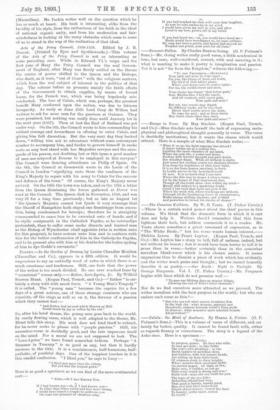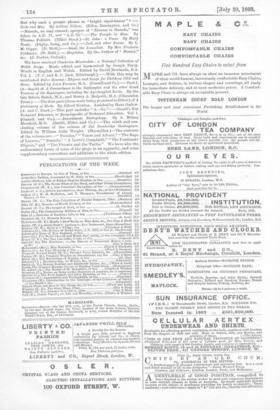POETBY. — In the Garden of Dreams, by Louise Chandler Moulton (Macmillan
and Co.), appears in a fifth edition. It would be ungracious to say an unkindly word of verse in which there is so much sweetness and tenderness. Still, one feels that the power of the writer is too much divided. No one ever reached fame by "occasional" verses only.—Esther, Love-Lyrics, 4'c. By Wilfrid Scawen Blunt. (Kegan Paul, Trench, and Co.)—" Esther" is cer- tainly a story told with much force. "A Young Man's Tragedy " it is called. The "young man" becomes the caprice for a few days of a great actress, one of those strange creatures who can simulate, off the stage as well as on it, the fervour of a passion which they cannot feel :— " Aid Esther had no soul which Heaven or Hell Could touch by joy or soften by the rod."
So, after his brief dream, the young man goes back to the world. In easily flowing verse, which is well adapted to the theme, Mr. Blunt tells this story. His work does not lend itself to extract, for he never seeks to please with "purple patches." Still, his narrative-verse is decidedly good, and the tale impresses itself on the mind. For a moral we are not supposed to look. The "Love-Lyrics" we have found somewhat tedious. Perhaps "A Summer in Tuscany" is as good as any, but then it hardly answers to the title. It is a reminiscence, half-humorous, half- pathetic, of youthful days. One of the happiest touches in it is this candid confession. "I liked you," he says to Lucy :—
" I liked you more than the others, For you had the longest gown."
Here is as good a specimen as we can find of the more sentimental sort :—
" I HAD knows You.
If I bad known you—oh, if I had known you—
In other days when youth and love were strong, I would have raised a temple to enthrone you On some fair pinnacle of cloudless song. Ii, If you had touched me then with your dear laughter, As now its echo smite, me in my grief, I would have given my soul to you, and after Lived in my love, grown old iu my belief.
If you had loved me,—oh, you would have loved me—
Earth would have worshipped us, its seers sublime, My song had been a psalm, and Saints had proved me Frophot and priest, your poet for all time."
Summer-Fallow. By Charles Buxton Going. (G. P. Putnam's Sons.)—Mr. Going writes really good verse, a little academical in tone, but sane, well-considered, correct, with real meaning in it ; what is wanting to make it poetry is imagination and passion. Yet it is not "far from the Kingdom," witness the following :— " To THE PROFEBBOR.—(RONDEAII.) Your path and mine lie wide apart ; For you, the things of head and heart, The level of that loftier plane,
Where soul draws near its source again : For me, the sordid street and mart.
Your choice has found that better part,' And, Martha-like, I fool the smart, And oft contrast, with secret pain,
Your path and mine But yet, two vessels may depart On different tacks, yet by one chart Direct their course across the main, To some far port : and so those twain May finish closer than they start, Your path and mine! "
—Essays in Verse. By May Sinclair. (Kegan Paul, Trench, and Co.)—Miss Sinclair sets herself the task of expressing meta- physical and philosophical thought generally in verse. The verse is decidedly meritorious, but it wants the charm which would attract. Here is a sample of what Miss Sinclair writes :- " What if on me the light supreme has shined P
It burns within me as a central fire,
Lighting the inner chamber of my. mind,
Where my soul sits, a vestal and alone, Feeding with fervent thought and pure desire Her steadfast flame. While all without is night, And round her circling courts are shadows thrown E'en from the brightness of that inner light. It is no fire from heaven snatched, to burn In kindly service to the household needs Of men. It is no torch that I can turn Where the dim way to deeper d irkness leads. Lit by the beams of that imprisoned star,
Though all the truth shine. dear within my mind—
Myself still subject to a mastering doubt.
Could I but raise that light and pour it far
Where the weak will, whose workings are without, Through all the broadening tracts of oireumetanee, Walks among shifting shadows, and is blind
And powerless to breast the shooks of chance I" —The Countess Kathleen. By W. B. Yeats. (T. Fisher Unwin.) —There is a certain weird power about the chief poems in this volume. We think that the dramatic form in which it is cast does not help it. Writers shoull remember that this form lightens their task, but seldom commends it to a reader. Mr. Yeats shows sometimes a great command of expression, as in "The White Birds ; " but his verse wants human interest.— Skeleton Leaves. By Frank Leytor. (Kegan Paul, Trench, and Co.)—Mr. Layton has a story to tell, full of sadness, indeed, but not without its lesson ; but it would have been better to tell it in prose than in verse,—better certainly than in the somewhat nerveless blank-verse which is his chosen metre. It seems ungracious-thus to dismiss a piece of work which has evidently coat the writer much pains and thought ; but we cannot honestly describe it as poetry.—Our Earth : Night to Twilight. By George Ferguson. Vol. I. (T. Fisher Unwin.)—Mr. Ferguson begins with lines which do not promise well :- " To pass our lifelong days as meaner things,
Chewing the cud of Time's brief elements."
Nor do we find ourselves more attracted as we proceed. The writer moralises with the best purpose in the world; but who can endure such verse as this P--
" But who can tell what unseen fountains flow In the high sky: what streams, paternal and Beneficent, outpour towards world's Time-walls Of Heaven! what measures move celestial breasts All-provident P "
—Zffltaff : the Maid of Anahuac. By Hanna A. Foster. (G. P. Putnam's Sons.)—This is a volume of verse of different, and cer tainly far bettor, quality. It cannot be found fault with, either as regards fluency or correctness. The story is a legend of the Aztec race. Hera is a specimen :—
"Ickes/t.
In purpose, power. He does who wills.
So men are gods ; so fate fulfils The soul's own prophecy ; so rise Earth ladders to meridian skies. And builders, with but human hands, Are toiling up from table-lands Of common good, to dizzy heights Where meteors flash uncertain lights On mortal names. Or high, or low, Make sure, 0 builder, as you go That every round is strong and true Build well—none else can build for you.
The logic of the eye defies Deduction ethical and wise, That good is beauty, beauty good. Men ever best have understood Bright objeat.1ossons—bowed the head
To beauty—quite apart, unwed To worth."
But why such a prosaic phrase as "bright object-lessons" P — Gods and Men. By Arthur Dillon. (Eden, Remington, and Co.) —Masada, we may remark, apropos of " Eleazar in Masada," was taken in A.D. 71, not " A.D. 76."—The Temple in Man. By Thomas Folliott. (Elliot Stock.)—St. John : a Poem. By Mary Beale. (Digby, Long, and Co.) —Tad, and other Poems, By L. IL Gipps. (D. Stott.)—Basil, the Iconoclast. By Mrs. Frederic Prideaux. (D. Nutt.) —Stapeldon. By the Author of " 2Eonial," &c. (J. Parker, Oxford.)



































 Previous page
Previous page